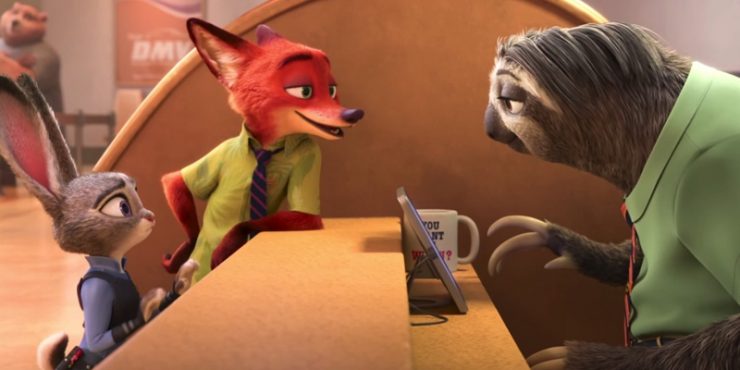Calling Zootopia a film for children is not inaccurate, but it skips a very important piece of information: the substance in this film’s screenplay (written by co-director Jared Bush and Phil Johnston) is made for the adult audience. Everything from the thinly-veiled metaphors to the pop culture references will resinate stronger with the parents then they ever will with the kids. And yet, Zootopia totally works in both capacities. I can only think of one other instance in which such a perfect balance was achieved, and that was Pixar’s The Incredibles in 2004. I’d claim that both of these films are actually films for adults wrapped in the kind of cutesy packaging that gets the kiddies into the theater. The Incredibles was a brilliant, stirring film about the dynamics of marriage and the truly American problem of handling your own heroism. Zootopia‘s view is a bit broader, less piercing in its dissection, more willing to play to the illusion of being a film constructed for children. It is so much more, though. The humanistic virtues that it espouses are not original and yet we find ourselves in a place where its themes of tolerance and multiculturalism are much needed for the whole country, if not just the younger ones.
Zootopia‘s reality is one in which animals have evolved past their barbaric predator-prey exchanges and have grown to embrace civility (no doubt helped by the complete absence of those pesky humans). This egalitarian society is no better represented than in the city of Zootopia, where animals of all kinds come for their chance to live a life free of prejudice. This is the goal of Judy Hopps (Ginnifer Goodwin) a Leslie Knope-ian bunny hailing from Bunnyburrow whose commitment to justice and fair play shone bright as she worked her way through the police academy and became the first bunny police officer ever. Where is she stationed? The aforementioned Zootopia. Her arrival is disappointing when her boss Police Chief Bogo (Idris Elba), an ornery water buffalo, limits her to parking duty. All this while the city is dealing with a rash of missing mammals cases. Fourteen mammals, all predators, have vanished – but Bogo, displeased with being forced to employ a measly bunny, keeps Judy in the meter maid suit. It isn’t until Judy comes face-to-face with Mrs. Otterton (Octavia Spencer), the wife of one of the missing mammals, that she’s able to get her hands on one of the cases – with the help of an eager assistant mayor, Dawn Bellwether (Jenny Slate), a sweet sheep ready to let smaller animals gain ground over the tyrannical beasts. But Bogo has stipulations: she must solve the Otterton case in 48 hours, or be forced to resign.
To find Otterton, Judy must depend on Nick Wilde (Jason Bateman), a sly fox who works as a professional con man, scamming his way into a lucrative ice pop business. After Judy realizes that Nick was one of the last people to see Otterton, she must rely on the unreliable Nick to help her in her search. At this point, something happens in Zootopia that I did not anticipate at all: it becomes a detective noir tale; an investigation into an isolated matter that quickly spirals into a mass conspiratorial uncovering, revealing that the exceptionalism that fills up the ego of so many Zootopians made indeed be built on hollow virtues. The very concept of film noir was built upon ideas of cynicism and urbanism. It both cherishes these ideas while being overtly critical. It was also born out of the Great Depression, a time when audiences would have loved to walk into the movie house and see something as fidgety in its own skin – a verification of their suspicions that the society they live in is inherently corrupt. It’s been a while since audiences have felt that way, and yet here’s Zootopia – a film made and marketed for children – replaying this same filmmaking philosophy. The sentiment behind Zootopia – its message of multi-cultural tolerance – is so simply told and thinly veiled. This is not metaphor. This is an explicit case for understanding the nuances of “others”. Zootopia is so eerily spot-on about the distasteful nature of Trump-era America that it almost seems like a miracle.
The quality of animation here is breathtaking, and Zootopia‘s chameleonic ability to rearrange itself based on the style it happens to be emulating shows that there is some real filmmaking here. The main crew credits (the film has two directors, but then lists screenwriter Jared Bush as a nebulous “co-director”) suggests that this movie was more produced than directed, and yet it still stands up to the filmmaking standard that Disney, as well as their sister studio Pixar, has set forth. It seems impossible to see this film from a child’s eyes, though. Sure, there are plenty of cute, fluffy animals, but the film is essentially a slow burn and at an hour and forty-eight minutes, it’s particularly long for this genre. The film is short on thrill and excitement, and heavy on dialogue and character. It’s nice to see that despite that, it still had the biggest opening weekend return in the Disney Animation’s history. I’m not sure if audiences are getting more patient, or if the Disney brand is so strong, that any film could have a could have a solid opening. Considering the years that went into making Zootopia, one can very easily say that this was not made to be the timely anti-discrimination (or “anti-Trump”) film that it turned out to be. Turns out, timing is everything. But that is the film that it became, and that’s one of the most pleasant movie-going experiences I’ve had in a while.
Directed by Byron Howard, Rich Moore, and Jared Bush










